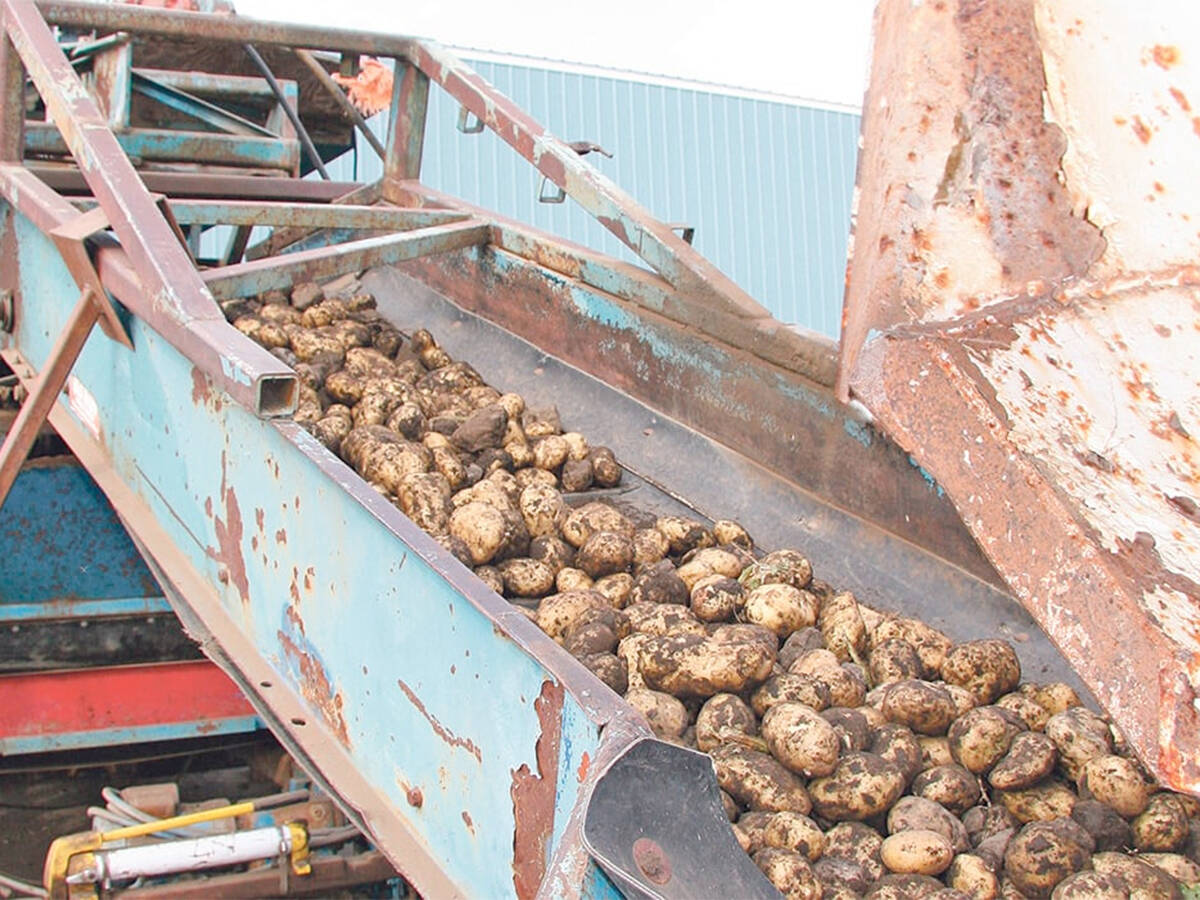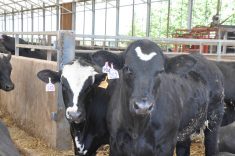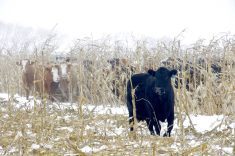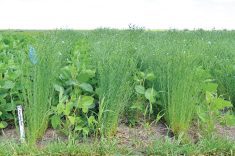The rest of the commercial properties in Manitoba are saying farewell to their school tax rebates under the 2024 Manitoba budget, but farmers get a pass.
The provincial budget, tabled April 2, included a reworked rebate, pitched by the provincial government as an affordability measure for lower income Manitobans. The budget erased the rebate for commercial properties “in anticipation of the introduction of a new education funding model,” tinkered with the credit’s thresholds in residential categories and introduced a $1,500 Homeowners Affordability Tax Credit, but the school tax rebate for farm properties was not affected. It remains at 50 per cent.
Why it matters: The April 2 budget is the first tabled since the NDP dethroned the Progressive Conservatives in last fall’s election.
Read Also

Potato growers beware new PVY strains
Newer strains of potato virus Y (PVY) are creating headaches for potato farms in Eastern Canada, and Manitoba farmers should pay attention
Keystone Agricultural Producers welcomed that news. “We encourage the province to continue working toward the complete removal of the tax on farm properties and that this is taken into account when developing the new provincial education funding model,” KAP general manager Brenna Mahoney said.
Farmers had previously been promised a phase-out of educational property tax on their properties under the previous government.
Offices to return
The province also aims to reopen two rural Manitoba Agricultural Services Corporation (MASC) centres this year, something promised during the NDP’s electoral campaign last year.
A total 13 offices were closed in 2021, leaving 10 operational. The government of the day said the move was an effort to modernize and consolidate agricultural services in the province.
The 2024 budget allocated $200,000 to reopen the first two service centres. Premier Wab Kinew linked the line item to attempts to reverse some of the centralization of government services that has occurred in recent years. “We’re very excited about this,” he said. “We think that decentralizing these services ensures not only that there is a MASC service center, but also the economic activity that comes along with that, the rent that’s being paid and the employment position(s) created.”
Sites for the two new centres have yet to be determined, but Kinew said the plan was to establish them within the calendar year.
“We’re going to set to work under the leadership (of) Minister Kostyshyn to figure out where the best fit is for those locations,” he said. “We’ve heard some lobbying and helpful suggestions so far and we expect that there’ll be a few more helpful suggestions before we land on the final selection.”
Livestock initiatives
Several other budget items are aimed at livestock producers.
The province announced increased funding to create, retain and attract veterinary medical professionals to rural areas. Other promises include freezing rent rates for Agricultural Crown lands and the launch of a livestock predation prevention strategy.
The Crown land rate freeze cements cuts promised late last year. The province had pledged that 2024 rents would sit 55 per cent below the amount calculated under Crown land regulations. The previous government had halved rates for 2023, citing production challenges in recent years.
A three-year pilot program gauging prevention methods against predation also recently wrapped up.
The Manitoba Beef Producers highlighted the livestock-specific budget items.
Lack of large animal veterinarians, meanwhile, has been a perennial concern in Western Canada. Organizations such as MBP and the Association of Manitoba Municipalities have flagged critical vet shortages in rural regions and have lobbied for various measures to fill the gap.
“MBP has done considerable advocacy work on matters like these given their importance to our members, so seeing them singled out in the budget is important,” MBP president Matthew Atkinson said in a news release.
The budget sets aside $135,000 to address the shortage of veterinarians in rural Manitoba. The funding includes tuition rebates for students trained at the Western College of Veterinary Medicine (WCVM), and funding for five additional seats within the VetSTEP summer work program for WCVM students, with a focus on commercial animals.
“KAP is excited to see $135,000 announced in this budget that will go toward the implementation of the veterinary strategy, which we developed in partnership with the team at Manitoba Agriculture,” said Mahoney.
MBP general manager Carson Callum noted a number of positive elements in this year’s budget. But while he welcomes the incoming predation strategy, “We’d like more clarity on what that fully entails,” he said.
The recently completed project, dubbed the Livestock Predation Prevention Pilot, set a foundation of knowledge on the topic. “We look forward to seeing what other steps can be taken to reduce interactions and reduce losses on farms,” he said.
Another line item in the 2024 budget notes that the province will be providing $5.2 million for “Wildlife Damage Compensation to compensate producers for losses sustained through crop damage and livestock predation.”
The province also announced increased funding for business risk management programs and boosted eligible loan amounts for the young farmer rebate from $200,000 to $300,000 and the lifetime maximum rebate from $20,000 to $30,000. The young farmer rebate is available through MASC and targets farmers under the age of 40 to provide assistance during the start-up phase of their business.
“These components of Budget 2024 are welcomed by Manitoba producers across the province,” KAP president Jill Verwey said. “In particular, the lending fee credit through MASC for farmers under 40 will provide significant benefits to the next generation of farmers.”
Municipal concerns
Items of more general rural interest included restoring the rural doctor recruitment fund and increasing policing grants available to municipalities.
The province’s budget document was heavy on health care.
“The announcements with health care will benefit all Manitobans,” said Association of Manitoba Municipalities president Kam Blight. “And there’s a specific rural touch to some of it.”
Blight called the restored recruitment money “excellent news” and also noted a commitment to improving rural medical transportation.
“The $22 million to help with medical transportation in rural areas is absolutely critical,” he said.
The province also provided a two per cent escalator to municipal funding, but Blight said AMM would have liked to see more. Funding and inflationary pressures were a common theme within resolutions presented at the AMM’s last annual meeting last fall.
“We’re pleased to see that our operating and strategic infrastructure funding baskets are going up by two per cent,” he said. “But it does fall short of the rate of inflation. There’s still some work to be done there to make sure it’s long term and predictable.”
Blight said the province has told him they are committed to work with the AMM to achieve that.
“There’s a lot of small victories in there that we’re very pleased to see, and we’re very appreciative of, but there wasn’t a lot of surprises,” he said.
The budget, however, falls short in addressing rural crime, Blight said.
“Greater steps to be taken towards addressing that issue, especially when one of the campaign promises this government has been saying is that they’re going to be tough on crime. We’re not seeing that in this budget.”
Blight argued that the increase to policing grants is just re-establishing funding that had been in place previously.
“There’s really new money’s being put towards public safety and that’s where the concern lies for us,” he said. “We’re going to continue to have these conversations and really push this issue with the province of Manitoba.”
Blight also felt that water and wastewater infrastructure funding was not adequately addressed.
The provincial budget did include funding for water and wastewater services, including a $4-million increase for the Manitoba Water Services Board to address “Manitoba’s water and wastewater infrastructure deficit,” but Blight said that money is only enough to maintain the current level of service.
“There needs to be a greater increase,” he said. “It’s hurting residential development and is deterring and turning away economic growth.”
Blight said he is hopeful that shortfall will soon be corrected by the province.
“We will continue to work with the province on this issue and continue to help them better understand the challenges we’re facing,” he said.
These kind of infrastructure discussions will also have to involve the federal government, he noted, “but we’re ready to get to work on this again.”
















